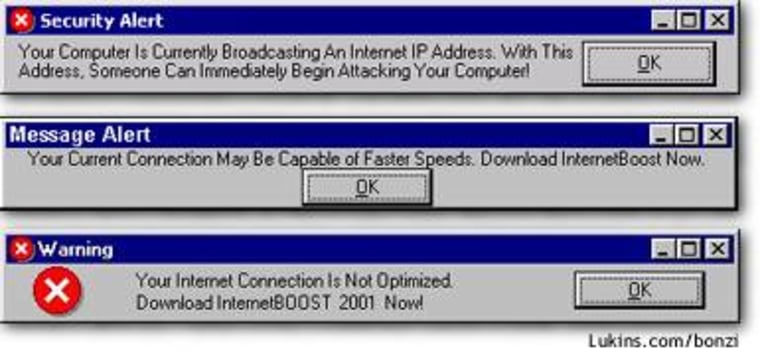A popular tool among some Internet advertisers — producing banner ads that look like Windows dialog boxes — is being challenged in court. A Washington state law firm that specializes in class action cases filed suit last week against Bonzi Software Inc. for deceptive advertisements. In its court papers, the law firm Lukins & Annis says Bonzi ads use a “Fake User Interface” to repeatedly deceive Internet users. Darrell Scott, the lead attorney on the case, says his firm’s main goal is a court order that will stop Bonzi from producing ads disguised as computer alerts.

MANY INTERNET USERS are familiar with the Bonzi Buddy software, which places an animated purple ape on a user’s computer screen that makes Web site recommendations. But Bonzi also attempts to drive traffic to its family of Web sites through aggressive banner advertisement campaigns that mimic Windows computer systems warnings. The ads are deceptive, and are designed to trick viewers into clicking through to the Bonzi Web site, generating revenue for the company, Scott said.
The suit was filed in Washington State Superior Court on Nov. 25.
An operator who answered the telephone at Bonzi Software said only that she “couldn’t provide any information” about the lawsuit. She directed MSNBC.com to an anonymous voice mailbox. Messages left there were not immediately returned.

This is not the first time Bonzi Software has been the subject of scrutiny. The firm has run afoul of many privacy advocates, who say the Bonzi Buddy software tracks users’ Internet travels.
According to the lawsuit, Bonzi is behind several massive Internet marketing campaigns, including one that placed 37 million banner ads during a single week in 2001. In total, the lawsuit says, Bonzi has blanketed the Internet with 300 million banner ads — and at one time, Bonzi was the third-most visited software Web site in the world, behind only Microsoft and Netscape.
Bonzi “tricked millions of Internet users into interrupting the work they were performing to respond to the fraudulent system message, only to unexpectedly find both computer and computer user thus hijacked to defendants’ commercial Web site, where defendants attempted to hawk services and software of defendants,” the lawsuit claims.
Scott said his firm has been investigating a number of deceptive Internet business practices, but Bonzi is the first Internet-related case it has filed. The firm specializes in class action cases, he said, and attempts to file litigation “that would serve some useful purpose.”
“The Internet is going to shape our life,” Scott said. “The quicker Internet business activities adhere to traditional legal norms, the better it will be for business and the Internet.”
SECURITY ALERT
In a classic Bonzi ad, Internet surfers are warned that their computer is broadcasting its IP address. “With this address, someone can immediately begin attacking your computer,” the ad reads. The Windows-like dialog box is labeled “security alert.”
Scott believes the ads do trick some users into thinking they have a computer problem.
“In fact, the only way to escape being commandeered to defendants’ commercial Web site was for the computer user to do precisely what habit, experience, and training had taught the computer user not to do: ignore the alert, warning, or error message,” the lawsuit says.
Those who click through a Bonzi banner ad often find they have trouble backing out of the company’s network of Web pages, Scott said. A frustrating 20-minute bout with a Bonzi banner ad drove Washington state attorney Philip J. Carstens to volunteer as the initial plaintiff in the class action case, Scott said.
To win financial compensation in the case, Scott’s firm would have to prove real financial damages, which would likely be difficult. But the attorney said winning compensation for victims was not his primary goal in the case.
“You do not need to prove damages to obtain an order of the court declaring the practice is deceptive and unlawful,” he said. “A declaration of that sort would have a rippling effect on the industry.”
On Wednesday, after the firm issued a press release and high-tech Web site Slashdot.org linked to it, the Lukins and Annis Web site received about 1 million hits, Scott said. Nearly all the response was positive.
“The reaction confirms somebody should be doing something,” he said.